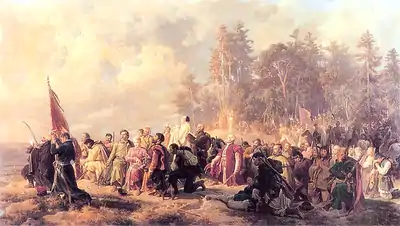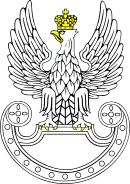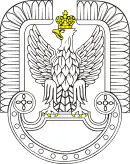Battle of Lanckorona
Two of the main battles of the Bar Confederation took place on the plains before Lanckorona. On 22 February 1771, the Bar Confederates defended Lanckorona and its Castle[1] from the Russian army led by Alexander Suvorov.[2] The Russians were forced to retreat after a surprising victory for the Polish army given that it was significantly outnumbered by the Russian side. The Battle of Lanckorona was the second battle before the mount of Lanckorona[3] and one of the greatest clashes of Polish and Russian forces during the Bar Confederation. It took place on 23 May 1771 near Lanckorona when a Polish formation of 1,300 men including French and European volunteers with 18 cannons was suddenly attacked by 4,000 Russians commanded again by general Alexander Suvorov.

The second battle was lost as the new commander on the Polish side, French envoy lieutenant-colonel Charles François Dumouriez[4] was caught off guard in an early morning attack by the Russian forces and he was unable to assemble his men. Many historians argue that it was sabotage on the part of Dumouriez as he was privately outspoken against the Polish nation and its Roman Catholic aspirations. Dumouriez was noted as calling Poles an "Asiatic nation" and relying on his French and European volunteers which lost the battle instead of "Asiats".[5] Antoine-Charles du Houx and Baron de Vioménil replaced Dumouriez in Bar Confederation army.
In 1793, Tadeusz Kościuszko[6] met with Dumouriez in Belgium as he sought the help of revolutionary France for the planned uprising in Poland. A few weeks later, after losing the battle in Neerwinden, Dumouriez betrayed his own country and crossed on to the side of French royalists and Austria. Once there, he betrayed Poland again and passed on the plans for the Kościuszko Uprising to the Prussians who passed it on to the Russians.
Józef Pułaski and his son Casimir Pulaski were the founders of the Bar Confederation. Casimir Pulaski went on to become the "father of American cavalry as he emigrated to North America to help in the cause of the American Revolution and freedom there. He distinguished himself heroically throughout the revolution, most notably when he saved the life of George Washington and became a general in the Continental Army, and when he created the Pulaski Cavalry Legion and reformed the American cavalry.
Source: Confederation of Bar[7]
References
- The Castle in Lanckorona Zamek w Lanckoronie - Wikipedia, wolna encyklopedia
- Battle of the Bar Confederation
- The Mount of Lanckorona pl:Lanckorońska Góra
- H. Welschinger, Le Roman de Dumouriez (1890).
- Andrzej Marceli Cisek: The Lies of Bastille.... p. 192-194.
- Nash, Gary; Hodges, Graham Russell Gao (2012). Friends of Liberty: Thomas Jefferson, Tadeusz Kosciuszko, and Agrippa Hull. Basic Books. p. 328. ISBN 9780465031481.
- http://www.britannica.com/EBchecked/topic/52446/Confederation-of-Bar, Encyclopædia Britannica.


